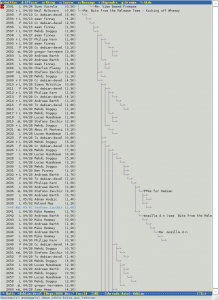![]() Just a quick note to let you know that (like many free software hackers apparently) I have an account on Google+.
Just a quick note to let you know that (like many free software hackers apparently) I have an account on Google+.
I’m not using it much yet but I like it in general. It’s interesting to see how Google transformed Joindiaspora‘s aspects into “circles”.
When Google will make an API available, I’ll probably setup it like my public Facebook page so that new blog posts are automatically announced. In the mean time, it’s going to be very quiet on my Google+ profile.
That said, I used it twice this week: the first time because I’m looking for a French developer with sysadmin skills, and the second time because I have a server to give away (Pentium IV 3Ghz, 4 Gb RAM, 200 Gb of diskspace in RAID1 Hard). If you take the server for a free software project, it can be hosted for free where it currently is (courtesy of Julien Danjou).
So if you’re also a Google+ user, feel free to add me to one of your circles.

